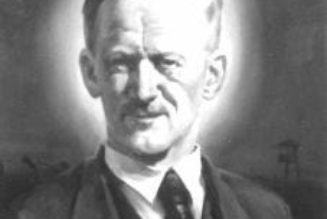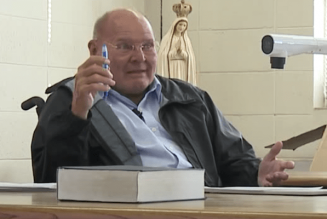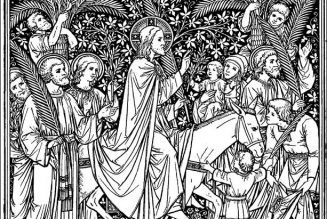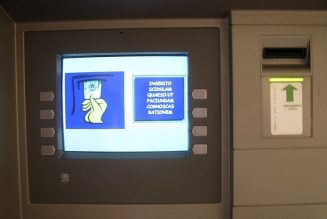By Dr. Jeff Mirus ( bio – articles – email ) | Jan 30, 2024
As we read Sacred Scripture, whether the Old Testament or the New, we are continually made aware of the importance of Jerusalem. Under the Old Covenant, this city is the great sign of the presence of God, the very center of His holiness here on earth, and the only place where He can be fully and perfectly worshipped. Jerusalem is also the great eschatological symbol of what it means to dwell with God through all eternity. And under the New Covenant, though Our Lord lamented over Jerusalem and announced its destruction, He also exalted Jerusalem as a symbol of both the Church and our heavenly union with God.
Here is His lament, as reported in Luke’s gospel:
“O Jerusalem, Jerusalem, the city that kills the prophets and stones those who are sent to it! How often would I have gathered your children together as a hen gathers her brood under her wings, and you were not willing! Behold your house is forsaken. And I tell you, you will not see me until you say, ‘Blessed is he who comes in the name of the Lord!’” …And when he drew near and saw the city, he wept over it, saying…“And they will not leave one stone upon another in you, because you did not know the time of your visitation.” [Lk 13:34-5; 19:41-44]
The words “Blessed is he who comes in the name of the Lord!” were fulfilled partially and exceedingly briefly during Our Lord’s triumphal entry into Jerusalem, but of course they are fulfilled more fully and permanently at the end of time, in the new heaven and the new earth, symbolically represented also by Jerusalem, as we know from St. John’s vision of the New Jerusalem in the final pages of the Book of Revelation:
Then came one of the seven angels…, saying, “Come, I will show you the Bride, the wife of the Lamb.” And he carried me away in the Spirit to a great, high mountain, and showed me the holy city Jerusalem coming down out of heaven from God, having the glory of God, its radiance like a most rare jewel, like a jasper, clear as crystal. It had a great, high wall, with twelve gates…and the wall of the city had twelve foundations, and on them were the twelve names of the twelve apostles of the Lamb. [Rv 21:9-14]
Note, then, how the Heavenly Jerusalem is both the consummation of the historical Jerusalem under the Old Covenant and the consummation of the Church, built on the twelve apostles in eternal union with Jesus Christ, the Lamb of God.
A practical application to our struggles
A careful reading of Scripture, therefore, reveals that the People of God under the Old Covenant prefigure not only the citizens of the Heavenly Jerusalem but also the People of God under the New Covenant, that is, the members of the Catholic Church. Just as we can see the intense need the Jews had to both rejoice in and pray for Jerusalem, we can also see the intense need we have to both rejoice in and pray for the Church. Moreover, Sacred Scripture provides the perfect texts to anchor and inspire our prayers, for just as the Jews saw the triumphs, trials and failures of Jerusalem as their own triumphs, trials and failures as a people, so too must Catholics see the Church in exactly the same way. The Church is the special bearer of God’s promises and graces to every person, yet she is beset in this world with trials until the end of time, trials distressingly similar to those suffered by Jerusalem—that is, by both external hostilities and internal corruption.
The difference is that unlike the earthly Jerusalem, which was destructible, the Church is indestructible, for she is the body of Christ who has already risen from the dead, and the bride of Christ who is already the King of Kings. And yet by the very mystery of Christ’s condescension—that is, by the mystery of our ability to join in his sufferings in order to participate in his victory—we are privileged to “make up what is lacking in Christ’s afflictions for the sake of His Body, that is, the Church” (Col 1:24). It is precisely by our own intensely sacramental participation in Christ’s life, death and resurrection—including, therefore, our freely accepted and freely offered participation in His sufferings—that we are called to strengthen the Church and do all we can to hasten her complete victory over sin and death.
This, of course, entails struggle here on earth, and especially the ongoing struggle to purify the Church—by which we mean the Church’s members—so that her privileged participation in the mysteries of Christ can bear ever greater fruit among all peoples, offering each one the maximum opportunity (as Isaiah put it) to “turn to me and be saved, all the ends of the earth!” (Is 45:22). Or, as Our Lord Himself put it:
Come to me, all who labor and are heavy laden, and I will give you rest. Take my yoke upon you, and learn from me, for I am gentle and lowly in heart, and you will find rest for your souls. For my yoke is easy, and my burden is light. [Mt 11:28-30]
The great challenge of this Divine condescension is that we must freely accept and even welcome our ultimate dependence on God in order to be gifted with a share in His life for all eternity. Meanwhile we groan within ourselves, the whole Church groans to her very depths, and indeed, as Paul said:
[The] whole creation has been groaning together in the pains of childbirth until now. And not only the creation, but we ourselves, who have the first fruits of the Spirit, groan inwardly as we wait eagerly for adoption as sons, the redemption of our bodies. [Rm 8:32-33]
Now, if we all groan inwardly, we must therefore struggle in union with all the members of the Church. Thus must we also pray unceasingly that the Church’s work may be completed in each one of us, even while recognizing that this great Church is made up here on earth solely of sinners, the salvation of whom will not be secured without their own cooperation.
This challenging reality brings us to the need for constant prayer, by which I mean a constant living awareness of God’s presence to us through the Church. Aware of this presence, we must pray for the Church herself, that great Church of hidden glory to which we might, in her members, apply St. Teresa of Calcutta’s description of the poor: “Jesus in distressing disguise”. But the good news is that we can use the inspired prayers of Scripture about the holy city Jerusalem as our own prayers for the Church today.
Praying the Psalms for the Church
The Psalms are the great prayer book of the Bible, adaptable to every conceivable aspect of our lives. But the Psalms which refer to Israel and especially to Jerusalem or Mount Zion—which is the most famous hill within Jerusalem, used in Scripture as a symbol of the entire city—are easily adapted by Catholics as prayers for the Church established by Christ Himself.
This prayerful intensity is particularly obvious in the so-called Songs of Ascents (or Gradual Psalms) which pilgrims to Jerusalem used to sing on their way to the city for the great feasts. In the Hebrew numbering, these are Psalms 120—134 (119-133 in the Septuagint and the Vulgate). The following themes are expressed in these notably brief psalms which extol and pray for the good of Jerusalem—and the Church:
- 120: Deliverance from deceit and lies, and the hardship of being far from Jerusalem [the Church]
- 121: “I lift up my eyes to the hills [of Jerusalem, that is, symbolically both the Church and heaven]. From where does my help come? My help comes from the Lord….”
- 122: The joy of standing within Jerusalem [the Church], going up to the temple. “Pray for Jerusalem’s peace!”
- 123: Living in contempt, we lift up our eyes to the Lord, keeping focused solely on Him.
- 124: Deliverance: “Our help is in the name of the Lord, who made heaven and earth.”
- 125: As the mountains surround Jerusalem [the Church], so does the Lord surround His people. Peace be on Israel [the Church]!
- 126: “When the Lord restored the fortunes of Zion, we were like those who dream!” (This entire Psalm foreshadows the renewal of the Church.)
- 127: “Unless the Lord builds the house, those who build it labor in vain.”
- 128: “Blessed are those who fear the Lord; …may you see the prosperity of Jerusalem [the Church] all the days of your life.”
- 129: Greatly have they afflicted us from our youth, yet they have not prevailed!
- 130: “Out of the depths I cry to you, O Lord.” “If you, O Lord, mark iniquities, O Lord, who could stand?”
- 131: So many things are too great for me. Hope in the Lord!
- 132: David’s [Christ’s] line is established by God. Jerusalem [the Church] is my resting place forever.
- 133: “There [in Zion, in the Church] the Lord has commanded the blessing, life forevermore.”
- 134: “Bless the Lord, all you servants of the Lord…. May the Lord bless you from Zion [the Church], he who made heaven and earth.”
How many, then, are the ways in which we might pray for the Church simply by praying these Songs of Ascents! There are also some other very interesting Psalms with the same value of serving as prayers for the Church. For example, in Psalm 48, we are urged to “tell the next generation that this is God, our God forever and ever. He will guide us forever!” And Psalm 87 foretells the city God founded on his holy mountain (the earthly Jerusalem, the Church, the New Jerusalem with its foundation in the apostles of Christ): “Of Zion, it will be said, ‘This one and that one were born in her’… The Lord records as he registers the peoples: ‘This one was born there.’”
This is our glory, to be born of the Church, and to work and pray that she may always bear the richest possible fruit in the souls who encounter and learn to love her. Indeed, we ought very often to close our prayers with Psalm 137, verse 9:
Let my tongue stick to the roof of my mouth, if I do not remember you, if I do not set Jerusalem above my highest joy!
In the name “Jerusalem” this psalm refers to the one, holy, catholic and apostolic Church, which is the very body and bride of Christ, both on earth now, and in heaven forever.
Sound Off! CatholicCulture.org supporters weigh in.
All comments are moderated. To lighten our editing burden, only current donors are allowed to Sound Off. If you are a current donor, log in to see the comment form; otherwise please support our work, and Sound Off!










